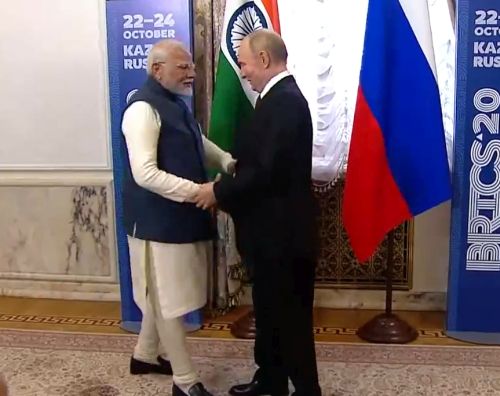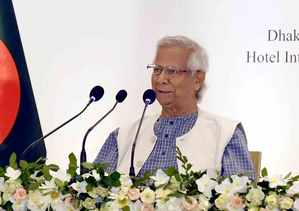International
IANS Analysis: Pakistan's military budget expansion amid economic uncertainty
New Delhi, June 26 (IANS) Pakistani Finance Minister Muhammad Aurangzeb presented the country’s 2024-25 annual federal budget amidst economic uncertainty on June 12. With a total of PKR 18.99 trillion ($ 67.84 billion), the government emphasized several reform measures aimed at meeting International Monetary Fund (IMF) conditions ahead of seeking a new bailout package. While key spending areas saw minor adjustments reflecting IMF directives and economic realities, there was a notable rise in defence spending, potentially diluting efforts to revive the economy in a piecemeal fashion.
The federal government has proposed a substantial PKR 2.12 trillion allocation for the armed forces in the upcoming budget starting July 1. This represents a notable increase of 17.6 per cent from last year’s 15 per cent rise to PKR 1.80 trillion. This also marks the second-largest percentage hike in defence allocations, slightly below the 18 per cent increase during the 2017-18 fiscal year under the previous PML-N government led by Nawaz Sharif.
Despite accounting for 1.7 per cent of the GDP, consistent with the previous year, this figure has sparked debate, with some highlighting it as a sign of military austerity amidst economic challenges, while others argue it marks a significant overall increase of nearly 18 per cent in annual allocations.
The allocation of financial resources within the Pak armed forces reveals that the Pakistan Army receives 47.5 per cent, followed by 21.3 per cent for the Pakistan Air Force, and 10.8 per cent for the Pakistan Navy. Additionally, 20.3 per cent is allocated to Pakistan’s Inter-Services Intelligence (ISI) and associated organizations. This distribution underscores the significant influence of the Pak Army and its affiliated inter-services entities, which collectively control nearly 68 per cent of the financial resources. This allocation also reinforces the Army’s predominant role within the military establishment and its broader impact on government affairs.
However, the actual allocation to the armed forces exceeds what is officially reported, as certain expenditures are categorized under different budget headings at the insistence of the military establishment, underscoring its significant sway over government decisions. This distinction is evident in how expenses for current servicemen, including salaries and welfare allowances totalling PKR 827 billion (39 per cent of the defence allocation), are included in the defence budget. Meanwhile, financial provisions for pension payments to retired servicemen are sourced from the general national budget rather than the defence allocation. Overall, defence spending surpasses 15 per cent of Pakistan’s total annual budget.
Consequently, Pakistan’s government allocated an additional PKR 662 billion from its current expenditure to cover pension and welfare needs for ex-servicemen. This amount, equivalent to nearly 31 per cent of the annual defence allocation, is not formally included in the armed forces’ budget. This approach may be intentional to obscure the true scope of defence spending and avoid public scrutiny. Combined, expenses for both current and former servicemen total PKR 1,489 billion from the state treasury.
This situation prompts inquiries into the military’s significant influence over Pakistan’s financial resources and, consequently, its influence over daily governance. The military leadership’s demand for government funding is striking, especially considering the extensive economic interests across various sectors maintained by all three branches of the armed forces, led by the Army. Pakistan’s armed forces manage a diverse portfolio of multi-billion-dollar economic enterprises, spanning construction, manufacturing, real estate, telecommunications, shopping complexes, and other sectors.
Various estimates indicate that Pakistan’s military conglomerate, encompassing entities like the Fauji Foundation, Shaheen Foundation, Bahria Foundation, Army Welfare Trust (Askari group), and Defence Housing Authority (DHA), generates an annual revenue of $26.5 billion as of 2023. According to the Pakistan government’s Senate submission, the Fauji Foundation owns diverse entities such as Askari Bank, Foundation Gas, Seed Multiplication Farm, Fauji Fertilizer, Fauji Cement, Fauji Power, Foundation Securities, Fauji Meat, Fauji Foods, and Overseas Employment Services, along with numerous shopping complexes nationwide.
Despite Pakistan’s economic challenges in recent years, these military enterprises have experienced significant growth. For instance, the assets of the Fauji Foundation alone reportedly surged by 78 per cent between 2015 and 2017, as per Bloomberg.
Likewise, the Shaheen Foundation oversees 21 projects, encompassing FM 100 radio, Shaheen Airport Services, SAPS Aviation College, Shaheen Aerotraders, Shaheen Knitwear, Shaheen Medical Services, Shaheen Insurance, Hawk Advertising, and two shopping complexes in Karachi and Lahore.
Meanwhile, the Bahria Foundation manages eighteen enterprises across Pakistan, including the Bahria Transshipment Hub, Bahria Enterprise Systems and Technologies, Bahria Dredging Company, Maritime Technical & Support Services, Bahria Maritime Services, Bahria Travels, Bahria Pharmacy, Al-Falah Trading Agency, Bahria Filling Stations, and Sino-Pak Refinery.
Additionally, the Army Welfare Trust (AWT), managed by the Pakistan Army as the Askari group, oversees several business ventures such as Askari Insurance, Askari Aviation, Askari Airport Services, Askari Travels, Mobil Pakistan, AWT Investments, Askari Enterprises, Army Welfare Sugar Mills, Askari Guards, Askari Woolen Mills, Askari Shoes, Askari Fuels, and Askari Real Estate. Moreover, the Defence Housing Authority (DHA) has developed eleven residential estates in major Pakistani cities including Islamabad, Lahore, Karachi, Peshawar, and Quetta.
What sets apart these military enterprises from private and government entities is their exemption from state oversight mechanisms. Parliament rarely scrutinizes the military budget or audits its expenditures. Civilian administrations have consistently faltered in holding the military accountable for its business interests, largely due to deficiencies in the administrative framework.
Exploiting these loopholes, the military has entrenched itself as a parallel authority in politics and economics, operating free from civilian supervision. The compromised political elite, vying to serve as a facade for military-dominated governance, further complicates this dynamic.
Thus, while ostensibly aimed at supporting the welfare of service personnel, the profits earned by the military’s corporate entities benefit shareholders and managers, many of whom are current or retired army officers. Instead of directly enhancing the armed forces’ welfare or easing the state’s economic obligations, these businesses primarily serve the personal financial interests of military leaders. Meanwhile, they continue to receive substantial government funds earmarked for the armed forces’ welfare expenditures.
The Pakistan military’s significant utilization of vital financial resources, both through budgetary allocations and other channels, facilitated by its collaboration with civilian authorities like the Shehbaz Sharif-led PML-N government, severely hampers the country’s economic recovery efforts.
The operational dynamics of the military underscore the urgent need for Islamabad to acknowledge that expanding military budgets pose challenges in defining and limiting the military’s appropriate role in national affairs.
–IANS
scor/
International
Lee Hsien Yang seeks refuge in United Kingdom

Lee Hsien Yang, the youngest son of Singapore’s founding father, the late Lee Kuan Yew, announced on Tuesday that he is now a political refugee in the United Kingdom after seeking asylum from the British government “as a last resort.”
“I remain a Singapore citizen and hope that someday it will be safe to return home,” Lee stated in a Facebook post, as reported by Channel News Asia (CNA).
Citing what he described as the Singapore government’s “attacks” against him, Lee, who is the younger brother of former Prime Minister Lee Hsien Loong, revealed that he sought asylum protection in 2022.
Lee Hsien Yang and his late sister, Lee Wei Ling, who passed away earlier this month, have been in conflict with their brother Lee Hsien Loong over the fate of their father’s home following his death in 2015, resulting in a public dispute that has estranged the siblings.
In an interview with the UK-based newspaper The Guardian, Lee alleged that a “campaign of persecution” compelled him to seek asylum in Britain.
In response to his claims, the Singapore government stated that there is “no basis” for his allegations of “a campaign of persecution” or other assertions regarding political repression in the country.
“Singapore’s judiciary is impartial and makes decisions independently. This is why Singaporeans have a high level of trust in the judiciary,” a government spokesperson remarked.
The spokesperson added that there are no legal restrictions preventing Lee and his wife, lawyer Lee Suet Fern, from returning to Singapore. “They are and have always been free to return to Singapore,” the spokesperson said.
Lee and his wife have been outside of Singapore since 2022, having opted not to attend a scheduled police interview regarding potential offenses related to providing false evidence in judicial proceedings concerning their father’s will and the family home.
Lee and his late sister, who had been living at the property, alleged they felt threatened while trying to fulfill their father’s wish to demolish the house. They also accused their elder brother, former Prime Minister Lee Hsien Loong, of abusing his governmental influence to advance his personal agenda.
International
Indo-Russian ties are stronger than ever before at BRICS

Kazan, Russia: Prime Minister Narendra Modi held a bilateral meeting with Russian President Vladimir Putin on the sidelines of the 16th BRICS Summit.
During the meeting, President Putin remarked, “I recall our meeting in July, where we had productive discussions on various issues. We’ve also spoken over the phone several times. I am very grateful you accepted the invitation to come to Kazan. Today, we will attend the BRICS Summit’s opening ceremony, followed by dinner.”
PM Modi responded by expressing his appreciation, saying, “I sincerely thank you for your friendship, warm welcome, and hospitality. It’s a great pleasure to visit such a beautiful city as Kazan for the BRICS Summit. India shares deep historical ties with this city, and the opening of our new embassy here will further strengthen these connections.”
International
Laos seeks to enhance nutrition amid climate change concerns

Vientiane (Laos), Aug 22 (IANS) Representatives from the Lao government and development partners have attended a conference here titled “Climate Change and Nutrition in Laos: Intersections and Interventions” to discuss the impact of climate change on nutrition in the Southeast Asia country and potential solutions.
Speaking at the conference, deputy director general of the Department of Hygiene and Health Promotion under the Lao Ministry of Health Viengkhan Phixay, said, “We gather to address a critical and interwoven issue: the impact of climate change on nutrition and how we can work together to tackle these challenges,” Xinhua news agency reported.
The Lao government is actively engaged in this endeavor, with numerous policies and initiatives aimed at addressing both climate change and nutrition, Lao National Television reported on Thursday.
“By leveraging the Scaling Up Nutrition network in Laos, which is led by the government, and supported by civil society, donors, and the United Nations, we have a robust platform to tackle the negative impacts of climate change while improving nutrition and overall health for everyone in Laos,” Viengkham said at the conference held on Monday.
The conference featured a series of presentations that not only detailed evidence-based research but also introduced innovative tools for measuring and enhancing nutrition under the impact of climate change.
The conference stressed the critical need for integrated approaches to tackle the intertwined challenges of climate change and nutrition, and setting the stage for impactful future collaborations.
–IANS
int/psd
International
One killed, seven injured in shootout in Iraq

Baghdad, Aug 22 (IANS) A civilian was killed while seven others were injured on Thursday in a tribal shootout in Iraq’s holy Shiite province of Najaf, according to a local security source.
The shootout erupted in the early hours between armed men from the local tribe in the al-Zarga area in northern Najaf, some 160 km south of Baghdad, a local police officer told Xinhua on condition of anonymity.
The clash resulted in the killing of an Iraqi civilian and the injury of seven others, including three Iranian Shiite pilgrims, the source added.
A joint force from the Interior Ministry’s emergency response division and Najaf provincial police arrested 53 gunmen from both sides of the shootout and seized weapons and ammunition, the Interior Ministry said in a statement.
It added that search operations are ongoing to locate additional gunmen and weapons, with more details to be released later.
The incident took place as numerous pilgrims traveled to the city of Karbala to observe Arbaeen, which marks the end of a 40-day mourning period for the killing of Imam Hussein, the grandson of Prophet Muhammad, in the Battle of Karbala in 680 A.D.
Typically, these pilgrims also visit Najaf as part of their journey to Karbala.
–IANS
int/jk/arm
International
Bangladesh seeks $1 billion budget support from World Bank

Dhaka, Aug 22 (IANS) Bangladesh’s interim government has sought $1 billion from the World Bank as budgetary support.
The call came from the country’s Power, Energy and Mineral Resources Adviser Muhammad Fouzul Kabir Khan’s meeting with Abdoulaye Seck, the World Bank’s Country Director for Bangladesh and Bhutan, in Dhaka on Wednesday.
He made the plea as the ministry owes more than 2 billion dollars to suppliers in import costs of power and energy, Xinhua news agency reported.
Khan mentioned that the interim government, which was formed with many pressing mandates, is due to settle a $2 billion debt left by the previous government in the power sector.
He said they have already suspended activities under the much-criticized Quick Enhancement of Electricity and Energy Supply Act 2010 and abolished the government’s power to set energy prices without any public hearing.
On August 5, the former Prime Minister of Bangladesh, Sheikh Hasina, was ousted from her country and power, ending her rule since January 2009.
This event was seen as a massive escalation, with what initially started as student’s protests and resulted in a major crisis in Bangladesh.
Earlier on August 8, Nobel laureate Muhammad Yunus took oath as the head of Bangladesh’s interim government.
–IANS
int/jk/as
-
Video2 years ago
PM Modi Attacks Congress in Karnataka with “Kerala Story”
-
Politics2 years ago
Siddaramaiah & DK Shivakumar sworn in as Chief Minister & Deputy CM respectively
-
Cricket2 years ago
CSK players rejoice 5th IPL title with their families (Pics)
-
Entertainment2 years ago
Karan Deol weds his longtime Girlfriend Drisha Acharya (Pics)
-
Sports7 years ago
History Of Official FIFA WORLD CUP Match balls
-
India2 years ago
Ashwini Vaishnaw: Railway Board recommends CBI probe in the Odisha railway disaster
-
Entertainment2 years ago
Urvashi Rautela dazzles on Cannes 2023 red carpet (Pics)
-
Entertainment2 years ago
Sunny Leone gets ready for Kennedy premiere in Cannes (Pics)






























